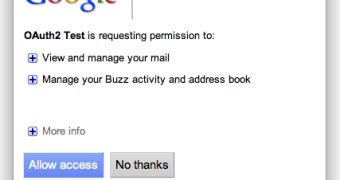Google is announcing support for the upcoming OAuth 2.0 authorization protocol for all of its APIs. While the protocol is not yet finalized, Google is giving developers a chance to get a head start and integrate Google services and authentication into their products easier and faster.
Along with the new technology, Google is also introducing a new consent page for users which aims to make it clearer what exactly they are sharing with the third-party app or website.
"Since we announced support for OAuth in 2008, we've seen tremendous usage growth in our APIs that require user authorization, like Calendar and Docs," Andrew Wansley from the Google Developer Team wrote.
"While the spec isn't completely finalized, Google is pleased to announce our experimental support of an easier way for developers to obtain user authorization for our APIs: OAuth 2.0 with bearer tokens," he announced.
"Whether you use our updated client libraries or just write to the protocol, you should be able to do more with less code," he added.
OAuth and similar technologies offer a simple way for applications and websites to access data and services via the Google APIs without requiring the users to supply their Google credentials.
This is great for obvious security reasons but it's also a more convenient way of tapping into your Google account data from third-party apps.
However, implementing support for OAuth can be a hassle and developers have been asking for a simpler protocol. This is what OAuth 2.0 aims to fix. The simplified protocol has not been finalized, but Google obviously feels confident enough to have it implemented and enabled for all of its APIs.
Developers can start building on top of the new protocol already, shortening coding time and making their apps smaller. Google is also introducing a new consent page for OAuth 2.0. The aim is to provide an easier to understand overview of the permissions the app is asking for.

 14 DAY TRIAL //
14 DAY TRIAL //